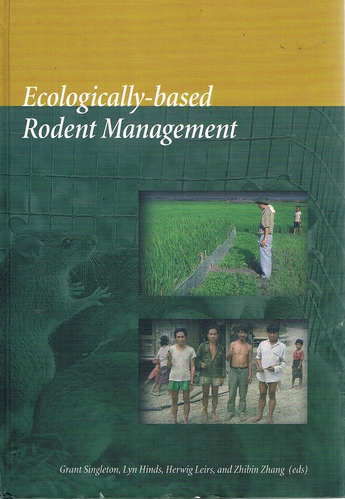Problems with Rodents
Rodents significantly impact people’s livelihoods by damaging field crops, contaminating/eating food after harvest, damaging personal possessions and infrastructure and transmitting more than 60 life-threatening and debilitating diseases. In Asia, rodents cause pre-harvest losses to rice of 5-10% where a loss of 6% amounts to 35 million tonnes, i.e. enough rice to feed >275 million people in developing countries for a year, and equivalent to feeding 34% of the undernourished people in the world. Estimates made in Tanzania show annual losses of 15% in cereals amounting to about 400,000 tonnes with a value of 42 million USD. Adding up the multiple impacts of rats on household livelihoods makes them one of the biggest constraints to improve food security and health of poor families and their livestock. Despite these problems, research on rodent pest management is often neglected. Building Africa’s research capacities to tackle rodent pest problems by developing innovative and sustainable solutions could be one of the most important interventions of the 21st century across the continent to reduce poverty and improve people’s livelihoods. Commonly recommended approaches for managing rodents with rodenticides are often inappropriate for poor urban and agricultural communities, with many poisons causing real damage to human health and the environment. The shortcomings of mortality control for rodents with high breeding potential are particularly apparent in developing countries where highly toxic, often illegal, acute poisons are preferred, although they have marginal impacts on reducing rat populations.
Our proposed project will investigate some of the preliminary criteria to understand whether Chinese innovation and technology could work in the Tanzanian context, collecting baseline data on efficacy against African rodent species, environmental effects, socio-economics and social perceptions. The outcomes of the project could lead to rodent fertility control products being registered for use in Tanzania and the prevention of often devastating impacts on farming households and communities across fourteen regions with a total population of 22 million people, where crop losses of 50-100% can tip families into food insecurity, the need for loans to buy food and subsequent chronic debt with long-term impacts on education and health. Commercial interest in bringing such products to market in Tanzania can readily be found within Tanzania and China. The Tanzanian government currently spends upwards of 4.1 million USD, which according to the National Rodent Control Centre, is inadequate for effective rodent control annually and would welcome the introduction of new innovations that stand a better chance of managing rodents more cost-effectively and sustainably.
What is Ecologically-Based Rodent Management?

Ecologically-based rodent management (EBRM) is a term coined nearly 20 years ago by Grant Singleton and Herwig Leirs. Following a workshop in 1996 in Morogoro, Tanzania at the Pest Management Centre, Sokoine University of Agriculture, the theme of ecologically-based rodent research was emphasized as the future of rodent research, particularly in Africa and Asia. Further discussions together with Lyn Hinds and Zhibin Zhang led to the first international conference on rodent biology and management held in Beijing in October 1998 and the seminal book Ecologically-Based Rodent Management published by ACIAR the following year.
EBRM shares many principles with the more familar term of Integrated Pest Management (IPM) commonly used in agriculture to describe how different strategies for insect pest management are integrated to sustainably control pests. EBRM wants to achieve similar goals to reduce the impact of rodent pests using knowledge about rodent species behaviour, physiology and their phenology of damage to sustainably manage rodent pests. EBRM proceeds on the basis that integrated strategies can be developed that reduce the economic and social impact of rodent pests in cost-beneficial ways that do not adversely affect the environment.
.png)